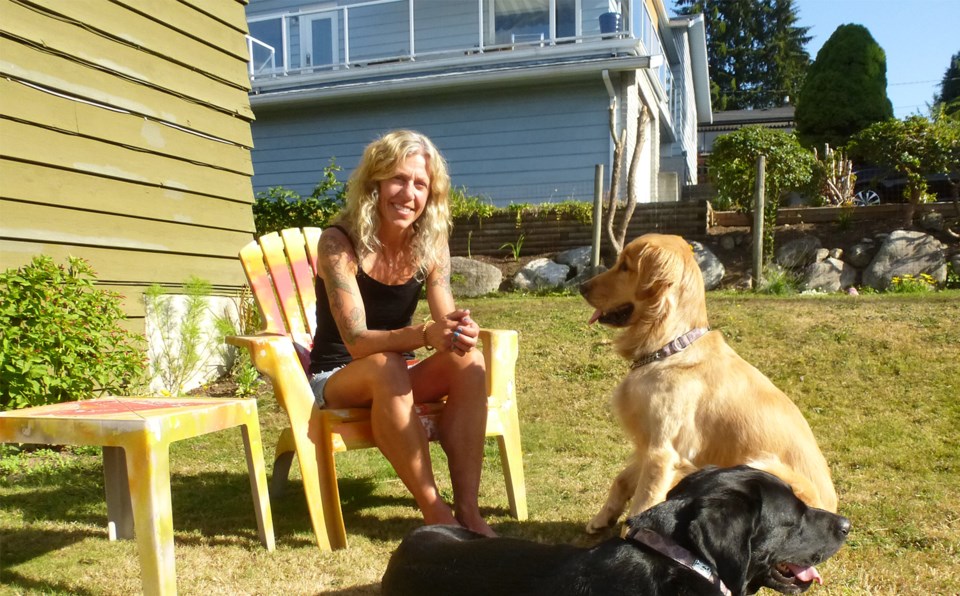Late afternoon sun bakes the grass in Leah Pells’ front yard as she relaxes with her dogs, Joe and Smokey.
But in just a few days, Pells will have to give up her tank top and cut-offs for regular work attire and get back into the fast-paced routine of school life.
She’s looking forward to it, says the long-time School District 43 counsellor, but she’s also a bit anxious.
“Everyone feels it at the start of a new school year — meeting new people, a new classroom, new friends. It’s also great, it’s a fresh start,” she says.
For youngsters heading back to school, the excitement of seeing their friends and getting new clothes, shoes and school supplies can be overshadowed by anxiety. Calming children’s fears is part of the back-to school routine, Pells says, and requires a common sense approach.
She lists her four pillars of wellness: getting enough sleep, exercise, nutrition and connection. And she says if everyone focused on these pillars, the world would be a calmer place.
Sleep is important for helping children deal with stress, Pells says, while exercise promotes brain health. Healthy eating is also key, and means cutting back on the summer junk food. And ensuring children have a place to connect with their peers is important to generate a feeling of belonging.
“It’s normal for people to feel anxious when facing something new," she says, "we just have to say, it’s OK, it will pass. We can’t shelter our children from that, that’s part of life.”
Pells notes there are numerous resources available online to help parents navigate their children’s emotions while also dealing with their own back-to-school stress.
“Anxiety BC, that’s a great starting point,” says Pells, “and if parents find that the anxiety doesn’t go away, they might also start with their family doctor.”
In her own home, Pells has already started back-to-school routines, and limits her son’s smartphone use, especially in the two hours before bed time, while also eliminating sugars and junk food from kitchen cupboards.
She’s been running in Mundy Park and walking up the Coquitlam Crunch to ensure she’s fit for new routines when the weather changes, traffic worsens and everyone’s in a rush to get somewhere.
“Exercise is one of the best things — it’s almost as valuable for depression symptoms as medical interventions,” says the former Olympic runner.
And the great thing about fall is the return of soccer and other sports and clubs, Pells says.
A new area of research and study, called self-regulation, encourages children to recognize their own emotional overload and use strategies to become calm again. Deep breathing, petting a dog, reading a book or listening to calm music are just some of the many things kids — and adults — can do to reduce stress and anxiety.
Says Pells, who will be bringing Smokey, a trained assistance dog, to school with her next week, a cuddle with a beloved pet is a good way to relax.
“We need to be able to teach strategies so children can help themselves. It’s not complicated, it comes back to a healthy lifestyle.”
TIPS FOR BACK TO SCHOOL
• Start your school sleep routine; Routines can be relaxed in the summer, so a week prior to school is a good time to adjust the family schedule to get everyone back into morning and bedtime habits. Establish bed times for the school year and start following them, ensuring the entire family is up when they would be for school. For older children, give them their own alarm clock and let them practise using it. Ensure that the entire family get involved so that your child doesn’t feel alone with these changes.
• Promote healthy eating habits; Nutrition is extremely important; it’s hard to cope well when you are tired or hungry, so provide your child nutritious and frequent snacks and build in regular routines. Start having your meals around regular mealtimes. Ask your child to help you create a school lunch menu for the first week of school and allow your child to pick out his or her favourite snacks as well as to help you plan your dinner meals.
• Encourage your child to share his or her fears and talk to your child about his or her worries; as well, practise coping skills. Touch base with your child at a regular time each day to discuss your child’s worries and encourage him or her to problem solve and plan. Role-play with your child and focus on the positive aspects — ask your child to list the three things that they are most excited about on the first day. Practise calm breathing with your child so they can learn to use this when their anxiety rises.
• A couple of days before school opens, do a dry-run — go to school several times — walking, driving or taking the bus. For young children, describe and draw out the route and include how long it will take. For even younger children, go to the school yard and play a few times before the first day of school.
• Ask your child to help choose the outfits for the first week of school, letting him or her pick out clothes for the first day.
• Together with your child, pack the backpack the night before, including treats.
• For younger children who are nervous about separating, suggest taking a special object to school that reminds him or her of home.
• Put a reassuring note in a child’s lunch can also help ease separation anxiety.
• Arrange that your child walks with a friend to school for the first couple of days, and arrange play days with school mates leading up to the first day.
– source: AnxietyBC; more information and resources is available at www.anxietybc.com



